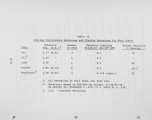| Title |
Technical Assessment of Refined Biomass Burn Demonstration at Florida State Hospital |
| Creator |
Varney, A. M.; Beck, J. K. |
| Publisher |
University of Utah |
| Date |
1982 |
| Spatial Coverage |
presented at Newport Beach, California |
| Abstract |
A refined biomass burn demonstration was conducted at the Florida State Hospital, Chattahoochee, Florida, during January 1980 to assess the feasibility of using pelletized wood fuel as an alternate energy source for the State of Florida. Three days of equipment calibration and five days of boiler evaluation tests were conducted to document boiler performance and stack emissions using pelletized wood, low sulfur coal, No. 6 fuel oil, and a 50/50 volumetric mixture of pelletized wood/coal. The pelletized wood fuel was found to be a feasible alternate fuel in systems originally designed for suspension burning of pulverized coal. The test data indicate that boiler efficiencies will be approximately equal on coal, wood pellets, and mixtures of wood/coal. Environmental emission standards will require moderate particulate control for wood operation. This study was sponsored by the Division of Forestry, State of Florida. |
| Type |
Text |
| Format |
application/pdf |
| Language |
eng |
| Rights |
This material may be protected by copyright. Permission required for use in any form. For further information please contact the American Flame Research Committee. |
| Conversion Specifications |
Original scanned with Canon EOS-1Ds Mark II, 16.7 megapixel digital camera and saved as 400 ppi uncompressed TIFF, 16 bit depth. |
| Scanning Technician |
Cliodhna Davis |
| ARK |
ark:/87278/s6cc137g |
| Setname |
uu_afrc |
| ID |
3515 |
| Reference URL |
https://collections.lib.utah.edu/ark:/87278/s6cc137g |



























